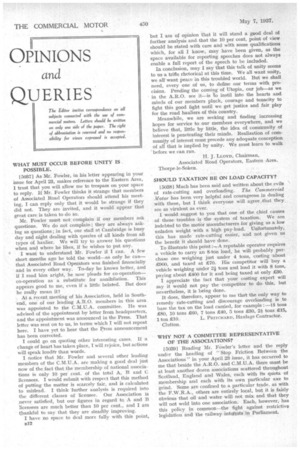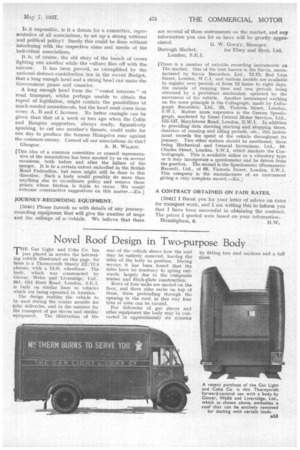OPINIONS
Page 46

Page 47

If you've noticed an error in this article please click here to report it so we can fix it.
and
QUERIES
The Editor invites correspondence on all subjects connected with the use of commercial motors. Letters should be written on only one side of the paper. The right of abbreviation is reserved and no responsibility for views expressed is accepted.
WHAT MUST OCCUR BEFORE UNITY IS.
POSSIBLE.
[50371 As Mr. Fowler, in his letter appearing in your issue for April 23, makes reference to the Eastern Area, I trust that you will allow me to trespass on your space to reply. If Mr. Fowler thinks it strange that members of Associated Road Operators should attend his meeting, I can reply only that it would be strange if they did not. They are invited, and it would appear that great care is taken to do so.
Mr. Fowler must not complain if our tnembers ask questions. We do not complain ; they are always asking us questions ; in fact, our staff at Cambridge is busy day and night dealing with queries of all kinds from all types of haulier. We will try to answer his questions when and where he likes, if he wishes to put any.
I want to understand Mr. Fowler if I can. A few short months ago he told the world—as only he can— that Associated Road Operators was finished financially and in every other way. To-day he knows better, and if I read him aright, he now pleads for co-operation-co-operation as a substitute for• annihilation. This appears good to me, even if a little belated. But does he really mean it?
At a recent meeting of his Association, held in South'end, one of our leading A.R.O. members in this area was appointed to the C.M.U.A. comMittee. He was advised of the appointment by letter from headquarters, and the appointment was announced in the Press. That letter was sent on to us, in terms which I will not repeat here. I have yet to hear that the press announcement has been corrected.
I could go on quoting other interesting cases. If a change of heart has taken place, I will rejoice, but actions will speak loucWr than words.
I notice that Mr. Fowler and several other leading members of the C.M.U.A. are making a good deal just now of the fact that the membership of rational associations is only 10 per cent, of the total A, B and C licensees. I would submit with respect that this method of putting the matter is scarcely fair, and is calculated to mislead. I think further analysis is required into the different classes .of licensee. Our Association is .never satisfied, but or figures in regard to A and B licensees are much better than 10 per cent., and I am thankful to say that they are steadily improving.
I have no space to deal more fully with this point, B12 but I am of opinion that it will stand a good deal of further analysis and that the 10 per cent, point of view should be stated with care and with some qualifications which, for all I know, may have been given, as the space available for reporting speeches does not always enable a full report of the speech to be included.
In conclusion, may I say that this talk of unity seems to us a trifle rhetorical at this time. We all want unity, we all-want peace in this troubled world. But we shall need, every one of us, to define our terms with, precision. Pending the coming of Utopia, our job—as we in the A.R.O. see it—is to instil into the hearts and minds of our members pluck, courage and tenacity to fight this good fight until we get justice and fair play for the road hauliers of this country.
Meanwhile, we are seeking and finding increasing hopes for service to our members everywhere, and we believe that, little by little, the idea of community of interest is penetrating their minds. Realization of community of interest must precede any adequate conception of all that is implied by unity. We must learn to walk before we can run.
H. J. LLOYD, Chairman, Associated Road Operators, Eastern Area. Thorpe-le-Soken.
SHOULD TAXATION BE ON LOAD CAPACITY?
[50381 Much has been said and ivritten about the evils of rate-cutting and overloading. The Commercial Motor has been very helpful and courageous in dealing with these, but I think everyone will agree,-that they are as virulent as ever.
I would suggest to you that one of the chief causes of these troubles is the system of taxation. We are indebted to the motor manufacturers for giving us a low unladen weight with a high pay-load. Unfortunately, this has made rate-cutting easier, and not given us the benefit it should have done.
To illustrate this point reputable operator requires a vehicle to carry an 8-ton load, he will probably purchase one weighing just under 4 tons, costing ,about £900, and taxed at £70. His competitor will buy a vehicle weighing under 21 tons and load it with 8 tons, paying about £400 for it and being taxed at only £30.
I appreciate the fact that your costing expert will say it would not pay the competitor to do this, but nevertheless, it is being done.
It does, therefore, appear to me that the only way to remedy rate-cutting and discourage overloading is to base the tax on the load carried, for example :-15 tons £80, 10 ions £60, 7 tons £40, 5 tons 230, 2i tons £15, 1 ton £10. L. PRITCHARD, Haulage Contractor. Clatton.
WHY NOT A COMMITTEE REPRESENTATIVE OF THE ASSOCIATIONS?
15030] Reading Mr. Fowler's letter and the reply under the heading of "Stop Friction Between the Associations" in your April 23 issue, it has occurred to me that beside the A.R.O. and C.M.U.A. there must be at least another dozen associations scattered throughout Scotland, England and Wales, each with its quota of membership and each with its own particular axe to grind. Some are confined to a particular trade, as with the F.W.R.A., others are entirely local, but it is fairly obvious that oil and water will not mix and that they will not weld into one association. Each, however, has this policy in common—the fight against restrictive legislation and the railway intnrests in Parliament. Is it impossible, is it a dream for a committee, representative of all associations, to set up a strong national and political policy? Surely this could be done without interfering with the respective aims and merits of the individual associations.
It is, of course, the old story of the bunch of crows fighting one another while the vulture flies off with the carcase. It has been proved, as exemplified by the national-defence-contribution tax in the recent Budget, that a long enough howl and a strong howl can make the Government pause and consider.
A long enough howl from the "vested interests" of road transport, whilst perhaps unable to obtain the repeal of legislation, might contain the possibilities of much-needed amendments, but the howl must come from every A, B and C licensee. No better example can be given than that of a week or two ago when the Celtic and Rangers supporters, always ready, figuratively speaking, to cut one another's throats, could unite for one day to produce the famous Hampden roar against the common enemy. Cannot all our associations do this?
Glasgow. A. R. WiLsox.
[This idea of a common committee or council representative of the associations has been mooted by us on several occasions, both before and after the failure of the merger. It is to a certain extent embodied in the British Road Federation, but more might still be done in this direction. Such a body would possibly do more than anything else to co-ordinate policy and remove those points where friction is liable to occur. We would welcome constructive suggestions on this matter.—En.] JOURNEY-RECORDING EQUIPMENT.
[50401 Please furnish us with details of any journeyrecording equipment that will give the number of stops and the mileage of a vehicle. We believe that there
are several of these instruments on the market, and any information -you can let us have will be greatly appre
ciated. G. W. GOVEY, Manager, Borough Market, for Elsey and Bent, Ltd. London, S.E.1.
[There is a number of suitable recording instruments on The market. One of the best known is the Senis, manufactured by Servis Recorders, Ltd., 72-75, Red Lion Street, London, W.C.1, and various models are available to register over 'periods of from 12 hours to eight days, the records of running time and rest periods being obtained by a pendulum mechanism operated by the movement of the vehicle. Another instrument working on the same principle is the Coltagraph, made by Coltagraph Recorders, Ltd., 28, Victoria Street, London, S.W.1. Rather more expensive is the Geecen Speedograph, marketed by Great Central .Motor Services, Ltd., 133-137, Marylebone Road, London, N.W.1. In addition to providing data showing starting and stopping times, duration of running and idling periods, etc., this instrument records the speed of the vehicle throughout its journey. Two other makers should be mentioned, these being Mechanical and General Inventions, Ltd., 10, Charles Street, London, SAVA, which markets the Controlograph. This is available either as a vibratory type or it may incorporate a speedometer and be driven from the gearbox. The second is the Speedometer (PermanentRecord), Ltd., of 68, Victoria Street, London, S.W.1. This company is the manufacturer of an instrument giving a very complete record.--En.]
A CONTRACT OBTAINED ON FAIR RATES.
[50411 I thank you for your letter of advice on rates for transport work, and I am writing this to inform you that I have been successful in obtaining the contract. The prices I quoted were based on your information.
Birmingham, 6. H.W.




















































































